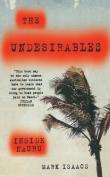AustLit
Latest Issues
AbstractHistoryArchive Description
''How long will we be here?' one man asked.
'Nobody could answer him. Nobody knew. The intention was clear: this was the No Advantage policy. Take them to a distant island, lock them away, punish them, forget about them. Criminals were given a sentence to serve; these men were not even given that. Lost hope ebbed out of the men in uncontrollable sobs and tears.
'Queue jumper, boat person, illegals. Asylum seekers are contentious front-page news but obtaining information about Australia’s regional processing centres is increasingly difficult. We learn only what the government wants us to know.
'Mark Isaacs worked for the Salvation Army inside the Nauru Detention Centre soon after it re-opened in 2012. He provided humanitarian aid to the men interned in the camp. What he saw there moved him to speak out.
'The Undesirables chronicles his time on Nauru detailing daily life and the stories of the men held there; the self-harm, suicide attempts, and riots; the rare moments of joy; the moments of deep despair.
'Mark's eyewitness account humanises a political debate usually ruled by misleading rhetoric.' (Publication summary)
Notes
-
Dedication: To Hattie, vivacious and witty, a lover of words and Yiddish and all things just; a bad present-giver but a consistent one. You were my biggest fan, and your soul will shine on in all that I write for now and for all time.
Publication Details of Only Known VersionEarliest 2 Known Versions of
Works about this Work
-
Watching Refugees : A Pacific Theatre of Documentary
2020
single work
criticism
— Appears in: JASAL , vol. 20 no. 2 2020;'Inspired by Robert Dixon's volumes on visual culture, colonial modernity and the Pacific, this article argues for a distinctive refugee imaginary in media witnessing and documentary cinema in the South, focussing on Eva Orner's 'Chasing Asylum' and two documentaries by Behrouz Boochani: 'Chauka' (with Arash Kamali Sarvestani) and 'Remain' (with Hoda Afshar).' (Publication abstract)
-
Burning Our Boats
2015
single work
criticism
— Appears in: JASAL , vol. 15 no. 3 2015;'The burning of boats, that classic figure for the impossibility of return, was, for over a decade a practice routinely staged by the Australian state as a form of ‘deterrence’ against other unwanted entrants – even as it served, for those just landed, to confirm the finality of their arrival. More recently, this official “torching rite” of no return meets its counterpart in the bizarre logic of the “orange lifeboat,” where asylum seekers are forcibly turned back to an uncertain fate aboard unsinkable, air-conditioned capsules.
'This paper considers questions of arrival, departure and refugee and diasporic subjectivities in the context of Australian refugee policy. Some readers may notice in my subtitle an allusion to V.S. Naipaul’s memoir, The Enigma of Arrival, but more immediate to my concerns is Amitav Ghosh’s articulation of a distinction between exodus and dispersal narratives. Whereas narratives of exodus fix their gaze on the shore of arrival, Ghosh suggests, dispersal compels a return to the pain of rupture and the movement of departure: the sting of smoke evermore in our eyes from our burning possessions; before us, the steady flaming of our boats.
'Marking Stuart Hall’s indispensable theorizing of diasporic subjectivities in the wake of his passing earlier this year, I ask how refugee and disapora bodies and subjects are made and unmade in the context of the Australian borderscape, understood as a set of makeshift, protean geographies of making live and letting die.' (Publication summary)
-
[Review] The Undesirables
2014
single work
review
— Appears in: The Advertiser , 24 May 2014; (p. 25)
— Review of The Undesirables : Inside Nauru 2014 single work autobiography
-
[Review] The Undesirables
2014
single work
review
— Appears in: The Advertiser , 24 May 2014; (p. 25)
— Review of The Undesirables : Inside Nauru 2014 single work autobiography -
Burning Our Boats
2015
single work
criticism
— Appears in: JASAL , vol. 15 no. 3 2015;'The burning of boats, that classic figure for the impossibility of return, was, for over a decade a practice routinely staged by the Australian state as a form of ‘deterrence’ against other unwanted entrants – even as it served, for those just landed, to confirm the finality of their arrival. More recently, this official “torching rite” of no return meets its counterpart in the bizarre logic of the “orange lifeboat,” where asylum seekers are forcibly turned back to an uncertain fate aboard unsinkable, air-conditioned capsules.
'This paper considers questions of arrival, departure and refugee and diasporic subjectivities in the context of Australian refugee policy. Some readers may notice in my subtitle an allusion to V.S. Naipaul’s memoir, The Enigma of Arrival, but more immediate to my concerns is Amitav Ghosh’s articulation of a distinction between exodus and dispersal narratives. Whereas narratives of exodus fix their gaze on the shore of arrival, Ghosh suggests, dispersal compels a return to the pain of rupture and the movement of departure: the sting of smoke evermore in our eyes from our burning possessions; before us, the steady flaming of our boats.
'Marking Stuart Hall’s indispensable theorizing of diasporic subjectivities in the wake of his passing earlier this year, I ask how refugee and disapora bodies and subjects are made and unmade in the context of the Australian borderscape, understood as a set of makeshift, protean geographies of making live and letting die.' (Publication summary)
-
Watching Refugees : A Pacific Theatre of Documentary
2020
single work
criticism
— Appears in: JASAL , vol. 20 no. 2 2020;'Inspired by Robert Dixon's volumes on visual culture, colonial modernity and the Pacific, this article argues for a distinctive refugee imaginary in media witnessing and documentary cinema in the South, focussing on Eva Orner's 'Chasing Asylum' and two documentaries by Behrouz Boochani: 'Chauka' (with Arash Kamali Sarvestani) and 'Remain' (with Hoda Afshar).' (Publication abstract)
-
cNauru,cSouth Pacific, Pacific Region,
-
cNauru,cSouth Pacific, Pacific Region,
- 2012-2013




